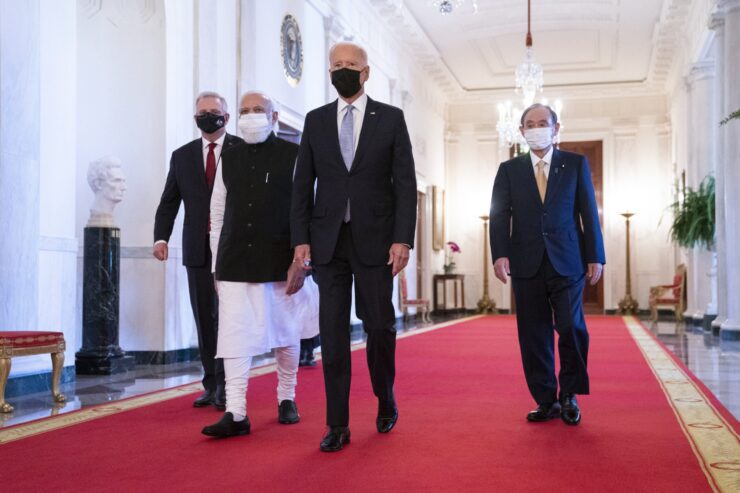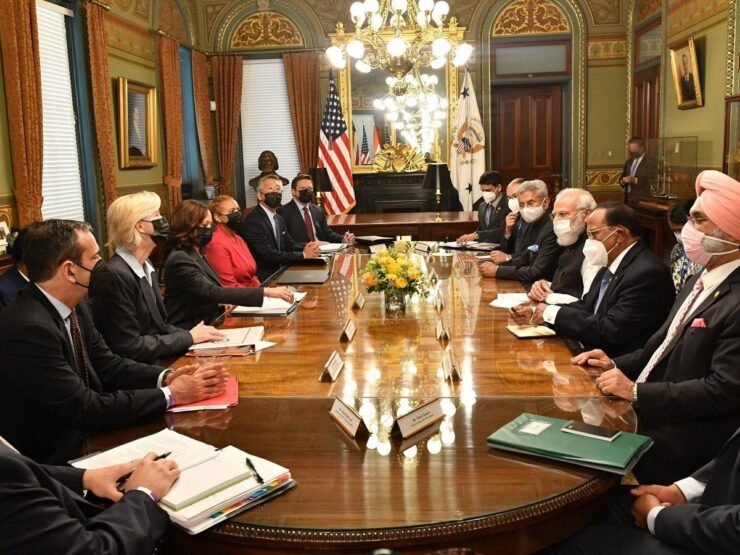
When Quad leaders held their first in-person meeting in Washington DC last week, Chinese propaganda machinery was seen projecting about an issue which was not on the agenda of discussion of the informal group. Global Times, the Chinese Communist government’s mouthpiece in its opinion piece, published just one-day after the summit said: “Although the leaders of the four countries did not mention China and were trying to play down disputes with China, the entire agenda and all topics in the summit focused on China.”
Obviously, it shows China’s efforts to make a mountain out of molehill. It failed to grasp the wider contours of coming together of India, Japan, the US and Australia. The Quad is not a military initiative, “it’s not against somebody. And, actually, if you look at the Quad statement, it actually says that we are for rule of law, we are for freedom of overflight, we are for peaceful resolution of disputes, we are for democratic values, we are for territorial integrity of states,” External Affairs Minister S Jaishankar aptly said in his remarks at the US-India Strategic Partnership Forum on September 30.
Yet Beijing, while reading in-between lines of Quad Leaders’ joint statement, feels that the group is in the business of China containment. “Together, we recommit to promoting the free, open, rules-based order, rooted in international law and undaunted by coercion, to bolster security and prosperity in the Indo-Pacific and beyond,” the Joint Statement maintains and this is what rattles China.
Australian Prime Minister Scott Morrison’s statement about the group should have given China’s frayed nerve some gentle comfort, especially when he said that the Quad is a partnership among like-minded countries and is not designed to be a security alliance. “Even China is welcome to contribute to the objective of ensuring a free and open Indo-Pacific,” Scott Morrison said last week while addressing media persons after his return from the US.
In no uncertain terms, such comments from one of the Quad leaders’ categorically manifest that the first-in person meeting of the group leaders in Washington DC on September 24 revolved around issues other than containment of China. Neither the joint statement issued after the first Quad leaders’ virtual summit this year in March nor the joint statement issued after the just concluded first in-person summit of the group, does talk about the creation of security architecture along the Indo-Pacific region.
Rather both joint statements emphasize on unity and centrality of the ASEAN and tackling of challenges emanating from Covid-19, climate change, terrorism and cyber-attacks. They talk about cooperation in critical and emerging technologies and space. The two joint statements also highlight support for safe, effective, quality-assured vaccine production and equitable access. They also call for providing high-standard infrastructure in the Indo-Pacific and creation of supply chain resilience.
A careful reading of these statements will reveal India’s weight and influence across the group. It prevailed on the US, Japan and Australia to make the Quad a group of like-minded countries with a common objective to serve the interest of humanity and become a force for global good.
Even though India supports the UN Convention on the Law of the Sea (UNCLOS) and calls for collaboration of the Quad countries to meet challenges to the rules-based maritime order in the East and South China Seas, it is opposed to ganging up against China.
India along with the rest of Quad members has a very substantial relationship with China. “I think it is very important not to be sort of railroaded into some kind of negative discourse, which actually is not from our script, it is somebody else’s script. And I don’t think we should fall for that. I think we need to be positive,” Jaishankar said at the US-India Strategic Partnership Forum.
In fact, India is against creation of any war theatre in the Indo-Pacific region and waging a full-fledged war against China at the time when it is busy in strengthening its economy and military power. Besides, instead of taking China by its horns, India wants to take benefits from Quad’s initiative on the development of supply chain resilience, production as well as distribution of vaccines to the needy countries, development of quality infrastructure in the Indo-Pacific region and climate change.
Under the Quad vaccine partnership, India’s Biological E has been tasked to produce at least a billion doses of Covid-19 vaccines by the end of 2022 for the world. Under $3.3 billion in the Covid-19 Crisis Response Emergency Support Loan programme, Japan will help regional countries in procuring safe, effective and quality-assured vaccines.

Besides, Japan, through its Japan Bank for International Cooperation, will work with India to invest approximately $100 million in the production of Covid-19 vaccines and other treatment drugs. While Australia will deliver $212 million in grant aid to purchase vaccines for Southeast Asia and the Pacific. This apart, Australia will allocate $219 million to support last-mile vaccine rollouts and lead in coordinating the Quad’s last-mile delivery efforts in those regions. Overall, India is at the centre of the Quad-led initiative for vaccine production.
India is going to derive immense benefits out of the Quad’s infrastructure partnership programme, which is focused on digital connectivity, climate, health and health security and gender equality infrastructure. Already, India, Japan, Australia and the US have invested more than $48 billion for development of health infrastructure, water supply, sanitation, renewable power generation, telecommunications, road infrastructure and others in the Indo-Pacific region. Since Quad countries have pledged to amplify their activities related to the development of these infrastructures, India, armed with rich experience in capacity building and handling wind, solar and hydro-related projects, is seeing big opportunities for itself in this partnership programme.
Also, under the critical and emerging technologies programme, India will emerge as a major beneficiary so far as development of an open, accessible and secure technology ecosystem is concerned. It should be noted that Quad will focus on four major areas: 5G diversification and deployment, technical standards, horizon-scanning and technology supply chains. Moreover, these technologies will be shaped by shared democratic values of India, Japan, Australia and the US. That means technologies should be developed through a multi-stakeholder approach that is adaptive, dynamic and aligns with democratic values, including respect for freedom of expression and privacy and should not be misused or abused by terrorists or any authoritarian regime.
However, salience of the Quad meet remained in its decision to deepen counter terrorism and humanitarian cooperation in accordance with UN Security Council Resolution 2593 and affirmation that Afghan territory should not be used to threaten or attack any country or to shelter or train terrorists, or to plan or to finance terrorist acts.
In clear terms, China has been seen barking up the wrong tree. The Quad is a group of like-minded countries which want to take on challenges of the contemporary world like Covid-19 pandemic, climate change, terrorism, emerging technologies. It is not in the business of taming China or encircling the world’s second economic power. It wants safer, healthier and happy world with no place for terrorism or authoritarianism.
–The writer is a senior journalist with diplomacy and international affairs being key interest areas. The views expressed are personal and do not necessarily reflect the views of Raksha Anirveda.








